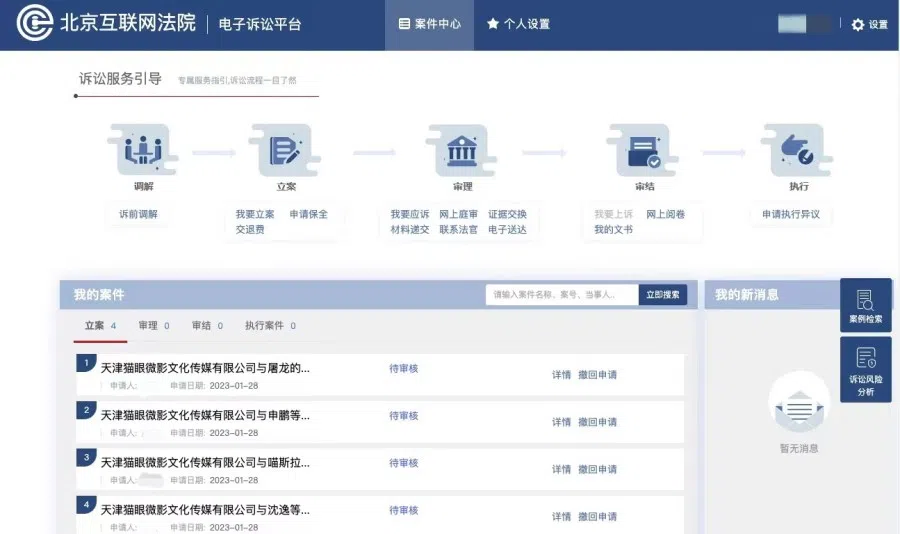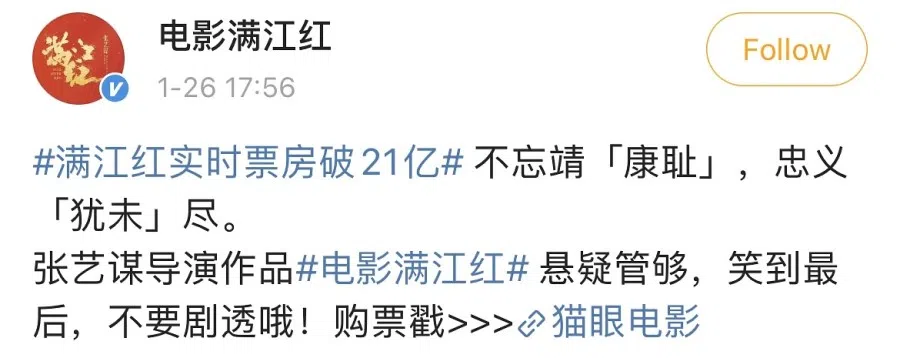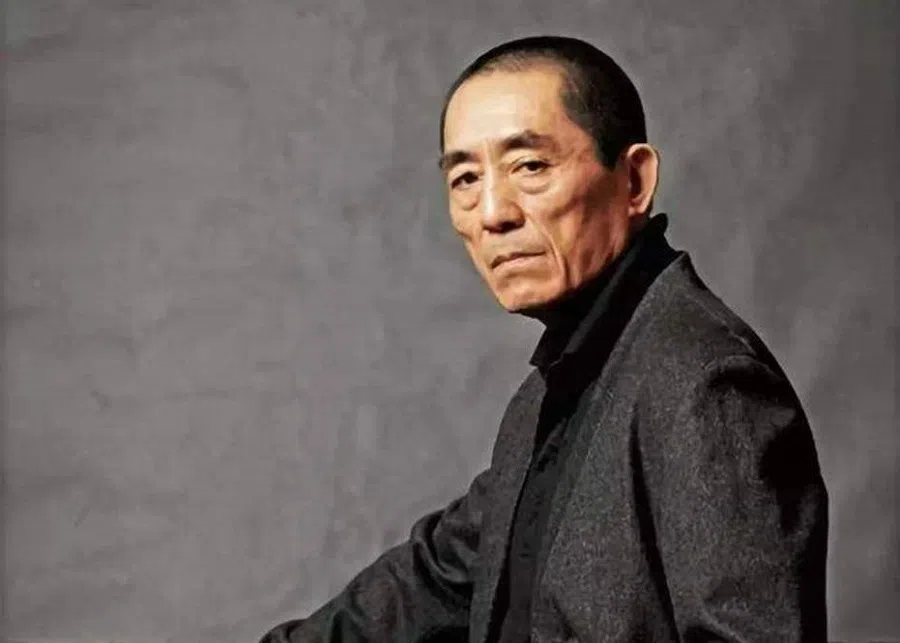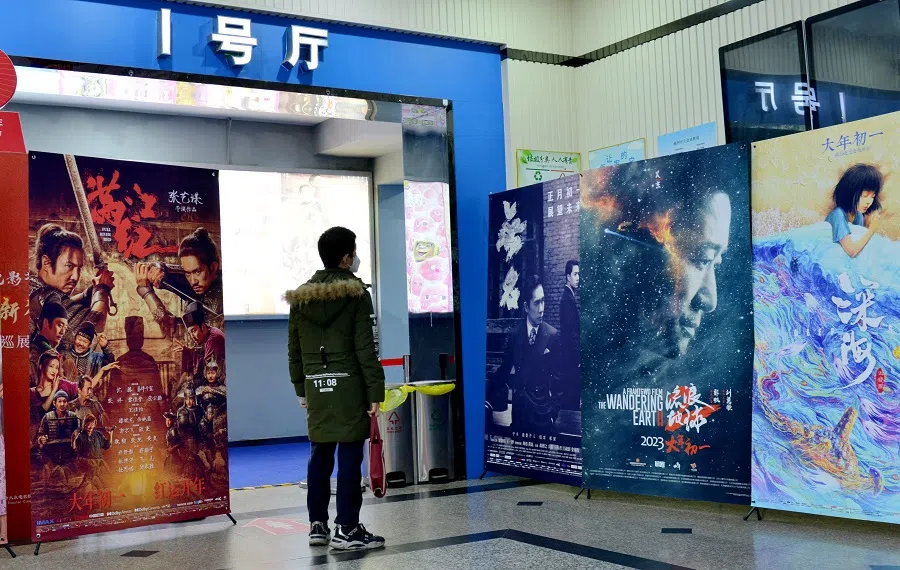Chinese films hit it big during CNY, but is it enough to save the industry?
The Chinese film industry has released several blockbusters over the Chinese New Year period, and crowds have also returned to cinemas. However, the off-screen drama seems to be more interesting than the movies themselves, with claims of various forms of dishonest or misleading figures for ticket sales, complete with lawsuits and competition for audiences.

In the first Chinese New Year (CNY) movie season since China lifted its strict three-year-long Covid-19 measures, the box office drew 6.8 billion RMB (US$973 million), the second highest in Chinese cinema history, just behind the same period in 2021. Moviegoers also grew by 13.16% year-on-year to 129 million, marking the start of recovery for China's film industry.
Along with box office and audience numbers, online debate over the quality and financial operations of the CNY movies also returned, with the top two films at the box office, Full River Red and The Wandering Earth 2, pitted against each other.
Besides debating over matters of finance, sentiment, traffic and concept, netizens are also convinced that the outperformer would change the face of the future of Chinese cinema.
More drama beyond the silver screen
According to figures on Maoyan.com, among this year's CNY releases, Full River Red directed by Zhang Yimou and starring Shen Teng and Jackson Yee claimed the top spot with 2.61 billion RMB. The Wandering Earth 2 directed by Frant Gwo and starring Wu Jing and Andy Lau took second place with 2.17 billion RMB. Coming in third was the animated feature Boonie Bears: Guardian Code at 748 million RMB.

Hidden Blade had a strong following before it opened, but comments were polarised after screenings, and it took fourth place with 493 million RMB. The niche market animated movie Deep Sea came in fifth with 359 million RMB, and the lowest-rated Five Hundred Miles came sixth with just 290 million RMB.
Also, Ping Pong of China, a historical retelling starring Deng Chao and Sun Li, opened on the third day of Chinese New Year on 24 January, raking in just 40.3 million RMB. It announced the next day that further screenings would be postponed until 17 February, which sparked speculation that the delay was because of its low takings and to avoid competing with the other CNY blockbusters.
However, the greatest controversy was ignited by top-grossing Full River Red, which saw a reversal of public opinion after its premier.
Full River Red is pegged as a comedy thriller for the family, with the draw of Jackson Yee and Shen Teng to audiences of all ages and hitmaker Zhang Yimou as director, making it one of the most high-profile movies. It was well received and had a good showing in the box office for its premier, scoring a solid 7.8 out of 10 on Douban on 23 January, second only to The Wandering Earth 2 with 8.3 out of 10.
... there were discrepancies in the box office sales for Full River Red.

As screening schedules were adjusted according to box office performance, it was revealed since 24 January that there were discrepancies in the box office sales for Full River Red. Despite the movie's superb opening, there was suspicion of fraudulent ticket sales and sold-out late-night "phantom screenings".
This led to a heated discussion and questions over screening schedules being manipulated by money, as well as fake box office takings. Netizens also dug up the news that Daniel Manwaring - IMAX China CEO appointed late last year - is Zhang Yimou's son-in-law, sparking speculation that this is why Full River Red got more IMAX screenings.
On 26 January, Full River Red's production company released an official statement to debunk these rumours, saying that the accusations of "phantom screenings", fraudulent ticket sales, and being manipulated by money were "baseless", adding that the company was gathering evidence and would uphold the film's legal interests through litigation and other means.
Then on 28 January, the movie's official Weibo account showed a screenshot of an online platform listing out the lawsuits filed against four "Big Vs" including Fudan University international politics lecturer Shen Yi. After these people responded on Weibo, there were media reports that the production company would not pursue the matter. However, the production company's official Weibo account stated that the lawsuits were still in process.

Whatever the case, the damage had been done to the movie's online reviews. Many netizens sarcastically said they feared commenting further lest they were issued a lawyers' letter.
Besides its litigation against netizens, the movie's official Weibo was also lambasted for being "illiterate" and making basic errors in its posts. The most serious error was in a post on 26 January, where the words of the poem Full River Red by Song dynasty general Yue Fei were mangled.
... Full River Red has gained attention for doing better at the box office than The Wandering Earth 2, deemed by netizens to be "the highlight of Chinese sci-fi genre".
The poem mentions the "Humiliation of Jingkang" (靖康耻), referring to the capture of the Northern Song ruler Emperor Qinzong by the Jurchen-led Jin dynasty, which ultimately led to the collapse of the Northern Song dynasty. The Weibo post broke up the Chinese characters in the middle of Jingkang's name so that it did not make sense, and was only edited on 28 January.

Indeed, Full River Red is nowhere a bad movie that deserves to be panned; the current shift in public sentiment is centred around the production and publicity. No wonder some netizens sarcastically said that this year's CNY season has been "the most dramatic ever, where what happens outside of the movies is more interesting than the movies themselves".
Publicity aside, Full River Red has gained attention for doing better at the box office than The Wandering Earth 2, deemed by netizens to be "the highlight of Chinese sci-fi genre".
The Wandering Earth 2 did not do too badly itself. It is expected to take in about 4 billion RMB at the box office, enough to cover costs and fund the next instalment. Furthermore, the official crowdfunding campaign for The Wandering Earth 2 raised 120 million RMB in 11 days. Given netizens' enthusiasm, this record-breaking effort brought in over 1,200 times the target, and the campaign was closed over 20 days ahead of schedule due to the limited capacity to produce the models, pins, and other related character products from the movie, showing the huge commercial value of this intellectual property.

The production team of The Wandering Earth 2 did not get directly involved in the controversy over Full River Red, but many netizens and film critics still pitted them against each other. One critic said the rivalry was not about the CNY top spot, but the future of China's film industry.
Who represents the future of Chinese films?
Objectively, Full River Red's all-star cast and ultra-short production process of less than two months is incomparable with The Wandering Earth 2, which had been in the works for four years and lacked sufficient funding.
The production models, promotion objectives and target audiences of the two films are so different that they would never have been discussed together had they not premiered at the same time. However, due to the lack of comparable sci-fi films in China's film industry, The Wandering Earth 2 was forced to compete with a commercial film.
Media interviews with the respective production teams also showed their different sets of goals.
Full River Red screenwriter Chen Yu told Shanghai Observer that after the film's profitability, costs and schedule were confirmed, the production team focused on revising the script with the actors. At the same time, a month before cameras started rolling, film director Zhang Yimou had also decided against filming the movie in a single take for a practical reason: one-shot films were too costly.
Chen added that Zhang is increasingly clear of what he wants to do and is on the journey of subtraction, constantly eliminating elements regardless of how valuable they may be and only focusing on simple storytelling techniques.

Quoting Zhang as having said that he wanted to become a "professional director" (职业导演), the Shanghai Observer article emphasised that Full River Red's stellar box office performance could prove that adequate professional maturity can ensure that film-making will no longer be a risky business venture. Since the movie's success is well-documented, people now think that it may indeed be possible to formulate or replicate high-grossing films.
Unlike the mature model of "Full River Red", the production of The Wandering Earth 2, as a pioneering sci-fi film of the industry, was laden with challenges, innovation and mistakes. Director Frant Gwo told Chinese state media People.cn that the production team had even hired interns to record and compile every mistake made during the production process.
In a mature industry, profit and passion would coexist or even complement each other.
Gwo explained that this was done in the hopes of creating a preliminary workflow for the industrialisation of sci-fi films that can be further refined with the production of more films. This will help sci-fi filmmakers avoid making the same mistakes. He said, "I have never felt that there's anything wrong with our imagination. It's just that we don't know how [to make sci-fi films]."
In line with Gwo's sentiment, People.cn gave high praises for The Wandering Earth 2, stating that if The Wandering Earth marked the beginning of the industrialisation of China's sci-fi films, the second instalment brings forth an anticipation of the advancement of sci-fi films.

Whether it is the hope that a mature business model will make filmmaking a less risky venture, or the passion to chart a new path for future sci-fi filmmakers, both directors are filled with love and excitement for the Chinese film industry, and their two visions are not necessarily at odds with each other.
Ideals and passion versus money and interests
In a mature industry, profit and passion would coexist or even complement each other. But it is difficult to accomplish both at a time when China's film industry is just recovering from the pandemic and Chinese films are just trying to step into the international stage.
In the same vein, it takes more than just capital, the director's ideals or a line-up of successful films to produce excellent Chinese films...
The performance of the stock market shows as much: although the Chinese box office performed well over the Chinese New Year holiday, Chinese film stocks took a collective dive on 30 January when the stock market reopened, and by a larger margin than in previous years.
Two films caught in the public opinion storm are not winners either - the stock of Huanxi Media, which produced Full River Red, plunged 12.84%, while the film's investor Beijing Enlight Media dropped 9.24% almost to a stop. Meanwhile, China Film Co, which produced and distributed The Wandering Earth 2, dropped over 5%.

National Business Daily quoted Analysys (易观) senior analyst Liao Xuhua as saying that, although the box office had already performed really well over the Chinese New Year holiday, the market had predicted a stronger showing of over 8 billion RMB prior to the festivities. As a result, the stock market dipped when expectations were not met.
He also pointed out that as a film with a fixed target audience, Boonie Bears: Guardian Code's third place on the holiday box office chart showed the seriousness of market discontinuity and the lack of competitiveness of other films. Furthermore, the fact that Deep Sea and Ping Pong of China - movies not exactly associated with Spring Festival festivities - also premiered during the holiday showed the film industry's overeagerness to recover.
Liao said, "At the end of the day, our expectations may have been too high. The recovery of the industry may not be as quick or as strong as we have expected."
Although the roll back of anti-Covid measures certainly stimulated the market and boosted consumption, a bout of "revenge spending" alone cannot truly save China's film industry. In the same vein, it takes more than just capital, the director's ideals or a line-up of successful films to produce excellent Chinese films and fundamentally reverse the country's film industry fatigue.
This article was first published in Lianhe Zaobao as "拿什么拯救你,中国电影?".


![[Big read] When the Arctic opens, what happens to Singapore?](https://cassette.sphdigital.com.sg/image/thinkchina/da65edebca34645c711c55e83e9877109b3c53847ebb1305573974651df1d13a)


![[Video] George Yeo: America’s deep pain — and why China won’t colonise](https://cassette.sphdigital.com.sg/image/thinkchina/15083e45d96c12390bdea6af2daf19fd9fcd875aa44a0f92796f34e3dad561cc)